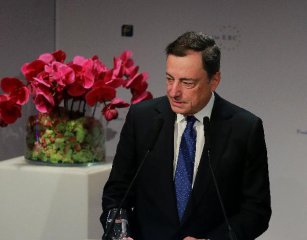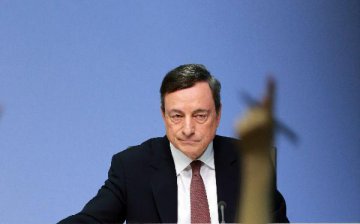
The European Central Bank (ECB) would increase its asset purchasing if the bloc's inflation outlook were subdued, ECB president Mario Draghi said Monday, dismissing calls for the bank to ease stimulus due to a recent inflation surge.
"Looking ahead, risks to the euro area outlook remain tilted to the downside and relate predominantly to global factors," Draghi told the European Parliament's economic and monetary committee in Brussels.
"If the inflation outlook becomes less favorable, or if financial conditions become inconsistent with further progress towards a sustained adjustment in the path of inflation, the governing council is prepared to increase the asset purchase program in terms of size and/or duration," he said.
His remarks came following calls for the bank to reduce stimulus measures as the 19-country eurozone saw inflation surge in December and January, largely due to energy price hiking.
But Draghi stressed that underlying inflation pressures remained very subdued and were expected to pick up only gradually.
"This lack of momentum in underlying inflation reflects largely weak domestic cost pressures. The still significant degree of labor market slack and weak productivity developments are weighing on wage growth," he said.
"Our monetary policy strategy prescribes that we should not react to individual data points and short-lived increases in inflation," he noted.
Eurozone's inflation stood at 1.8 percent in January, hitting a nearly four-year high and was foreseen to reach the ECB's target of "close but below 2.0 percent" in the coming month. However, the core inflation, excluding food and energy, was still low.
In December, the ECB extended its bond buying program by nine months until the end of 2017, aiming to further shore up the bloc's growth and push the inflation to reach the target.
From April, the bank will buy only 60 billion euros (64 billion U.S. dollars) of bonds a month, rather than 80 billion euros.




















Latest comments